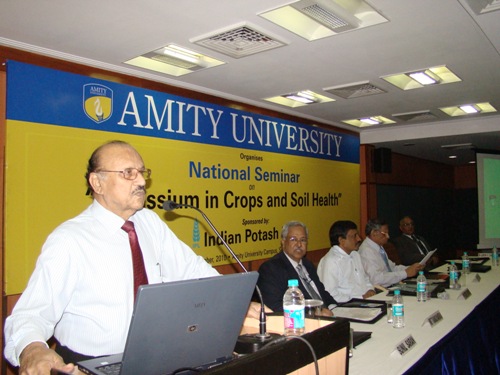01 Oct 2010|Noida | Amity University Campus, Sector-125 Noida
Experts Call Upon The Use Of Potash In Farming For Enhancement Of Quality Of Crops, At Amity University

Amity Science Technology & Innovation Foundation, Amity University in association with Indian Potash Limited organized a day long National Seminar on “Potassium in Crops and Soil Health” at the Amity University Campus, Sector – 125, Noida.
The seminar aimed at bringing together Senior-level Scientists, Academics, Entrepreneurs and Students related to agriculture and horticulture to discuss the role of Potassium, its imbalance and its role in fertilizer use.
Welcoming the honorable guests and dignitaries, Dr. Sunil Saran, Chairman Amity International Centre for Post Harvest Technology & Cold Chain Management, Amity University, Noida shared Amity’s association with agriculture and that Amity’s strongest area is its research. He emphasized on the importance of nutrients and micronutrients and suggested application of Potash to overcome the problem of soil depletion.
Inaugurating the seminar, Mr. Satish Chandra, IAS, Joint Secretary (Administration & Movement), Dept. of Fertilizers, Ministry of Chemicals & fertilizers, said “India’s agriculture is not yielding sufficiently. There is tremendous focus on chemical fertilizers whereas for complete health of soil there is need for organic fertilizers and bio mass. Fertilizer use efficiency can be increased if there is balanced fertilization with all its components.” He informed the audience that in the year of 2008 – 2009, a sum of one Lac in Indian Rupees was spent in fertilizer subsidy and Potash is imported at $ 625 per ton which is sold to Indian farmers at a subsidy of $ 100. Mr. Chandra apprised the audience about “How to make Indian agriculture sustainable, Use of Potash in Indian agriculture- its impact over productivity of crops, How indiscriminate use of chemical fertilizer results in heavy soil infertility, Problem of low consumption of fertilizers despite subsidy, Problem of malnutrition (paucity of nutritious food) and How food security is a major concern for nations.” He shared the knowledge of customized fertilization for a particular area and crop to suit the requirement.
Addressing the seminar, Mr. T Ramachandran, General Manager, Marketing, Indian Potash Limited informed the audience that Potash (K) is the third major essential plant nutrient along with N and P. Plants cannot grow its complete life cycle without Potash. Its importance in plant growth and development has been known for over 150 years. Farmers must add K along with N and P through fertilizers and make high yield possible. Potash activates more than 60 enzymes, promotes photosynthesis resulting in formation of carbohydrates, oil, fats and proteins, improves efficiency of N fertilizers by enhancing production of proteins, helps in sugar formation in plants, regulates respiration in plants, improves quality of crops and prolongs shelf life of crop produce and results in efficient biological N fixation.
Dr. R.K Tewatia, Chief (Agricultural Sciences) Fertiliser Association of India, New Delhi, while presenting his paper on “Potassium Use Scenario in India chiefly discussed “The role of Potassium in crop production as an enzyme activator, stalk strengthener, water regulator etc).. Doling out suggestions to overcome the problem he said, “there is vast scope to increase the K consumption as the per hectare fertilizer K consumption is very low, Timely and adequate availability of Potassic fertilizers must be ensured by making import contracts well in advance and finally should make concerted and coordinated promotional efforts to educate the farmers about the increasing need of K in balanced fertilization.”
Dr. Bijay Singh, ICAR National Professor, Department of Soils, Punjab Agricultural University, Ludhiana presented his paper on “Potassium Imbalances – A threat to sustainability of the rice-wheat cropping system in the Indo- Gangetic plains. During the session Dr. Singh elaborated the problem of very less use of K fertilizer by farmers in the Indo-Gangetic plains, the decline in yield of Rice and Wheat because of the deficiency of K in soil, the possibility of facing difficulty in maintaining the present production level of Rice and Wheat in the near future and the possibility of no return in Rice and Wheat farming without application of adequate amounts of Potassium fertilizers.
Presenting his study on “Maintaining Soil health through Potassium application”, by Dr. Anand Swarup, Head, SS & AC, IARI, New Delhi, dwelt on “Unbalanced fertilizer use in India with respect to Potassium, how continuous use of nitrogenous fertilizers adversely affects soil fertility and the importance of continuous monitoring of available and non-exchangeable K status for making sound K fertilizer recommendations for sustaining crop productivity in different soil types.”
Technical sessions on “Role of Potassium in balanced fertilizer use for increasing crop productivity”, by Dr. Pradeep K Sharma, Dean College of Agri, CSK HPAU, Palampur, “Role of Potassium in Sugarcane production”, by Dr. R.L Yadav, Director, IISR, Lucknow, “Quality enhancement through Potassium application”, by Dr. Kaushik Majumdar, Director, IPNI – India Programme, Gurgaon, “Response to Applied K in presence of Nitrogen & Phosphate in crops at Farmers fields IPL – IMPHOS Experience” by Dr. Gautam Dev, IMPHOS Consultant – India, Ludhiana were held.